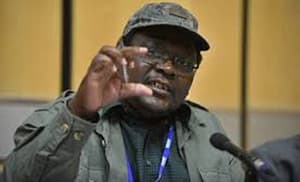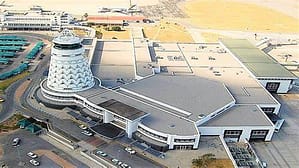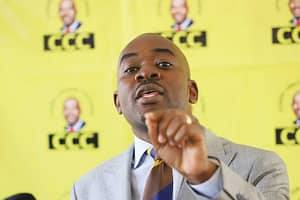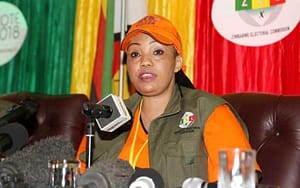Nothing to celebrate on Zimbabwe’s independence

The late Alex Magaisa
By Alex Magaida
Zimbabwe turns 41 on Sunday 18 April 2021. It will be the second independence anniversary during the COVID-19 pandemic, which means there is no room for large public gatherings or celebrations. Yet, if you were to take a straw poll among Zimbabweans today, chances are that very few would say the pandemic makes any difference. So dire are the circumstances in which the country is currently located and so bleak does the future look that the biggest dream for most young Zimbabweans is to leave the country and join millions of fellow citizens who have departed over the last two decades.
Zimbabweans of all ages have known turbulence for most of their lives, thanks to governments that share a streak of intransigence going back to colonial times. But for a brief moment in the early 1980s, there seemed to be a reason to hope. 1980, the year Zimbabwe gained independence was a critical juncture in the history of the country. It signaled a transfer of power from white minority rule to democratic government in which the black majority finally had a say.
There were mixed reactions to the advent of independence. Large numbers of the white population left in the early years of independence, fearful of what was to come. They had lost power and privilege and they did not trust the new government. On the other hand, there was great hope among most black Zimbabweans. Some who had emigrated during the war returned home hoping to rebuild the country.
It is ironic, therefore, that 41 years later, the country has experienced large numbers of migration, with the young, educated, and skilled black population joining the trek that began with skeptical whites in the 1980s. The irony is most defined among the older black Zimbabweans who returned in the 1980s amid great hope but have had to retrace their steps back to the foreign countries. Some openly say that they wish they had never made the “mistake”.
It is, indeed, a measure of the fall of a country that many people now openly question the very purpose of independence, for which so much was sacrificed. This is disappointing, not because the people are wrong, but because the leadership has betrayed the promise of independence and desecrated the memory of all those who died for the cause. It is not unusual for people to openly say that “they died for nothing”. This is an expression of frustration at the apparent privatization of the gains of independence by a tiny minority that is driven by an unhealthy sense of entitlement at the expense of the majority.
The cheque that continues to bounce
When most people refer to Martin Luther King Jr’s great speech during the March on Washington, they almost always quote the “I have a dream” portion and it is, of course, very beautiful and easy on the memory. But there is another powerful part that is relevant to all countries that have gained independence from some form of oppression in the past. It is the part where he refers to the US Constitution and Declaration of Independence as a “promissory note”.
It was, he said, a “promise that all men would be guaranteed the inalienable rights of life, liberty, and the pursuit of happiness”. The problem, Dr. King says was that it was “obvious” that America had “defaulted on this promissory note in so far as her citizens of color are concerned”. In his view, it was “a bad check” which had “come back marked “insufficient funds.” He went on to list several challenges that were being faced by “citizens of colour” at the time. The power of these words is that they are as relevant to today’s America as they were back in 1963. But they also ring true for many people in other places around the world.
The promissory note is an appropriate metaphor for many Zimbabweans who at independence in 1980 believed they had escaped repression, gained freedom, and could pursue better and more fulfilling lives. For most of them, the cheque has bounced several times. It has been returned marked “insufficient funds,” In the case of the older generation, the notion of insufficient funds is literal. Consider a retired person who after working more than 40 years and faithfully contributing to a pension fund every month is earning less than US$10 in pension. Remittances from the diaspora have become the new social safety net. But spare a thought for families that have no one in foreign lands to help them.
In the case of young people, most of them have never earned a paycheque all their lives because they have never been formally employed. A lot of them have given up on ever landing formal employment. In this regard, they are worse than their parents and grandparents. Their conditions were difficult, but they could earn a living. Many young people spend their time loitering in the ghettoes and large numbers are finding refuge in drugs and other intoxicating substances. It is not hard to see why a lot of the young people now question the very idea of independence and if they had the chance, they would simply pack their bags and leave. Both young and old people take risks crossing the crocodile-infested Limpopo River into South Africa where they are met with hostile exhortations to return home.
The situation is made worse by state-sanctioned human rights violations and the sheer lack of freedom. The liberation war was an epic struggle to restore the dignity of the African, to free citizens from the dehumanizing experience of colonial rule, and to ensure control of resources by citizens. Yet, 41 years after independence, citizens are denied their dignity, people who hold different political views are imprisoned and the bulk of national resources are parcelled out among a few political and military elites and their associates. What has changed is the colour of the oppressors and accumulators of wealth, otherwise, there are continuities of repression and plunder at the expense of the majority. Viewed through this prism, the idea of independence seems meaningless to most poor people. Whether it is being done by white or black, they are still suffering.
At 41, Zimbabwe faces several unresolved questions and they are at the heart of the national crisis. In the following part, I will sketch a map of the various inter-linked questions that, when examined collectively, form the National Question. I hasten to add that the list is brief and non-exclusive.
Developmental Question
One of the big questions concerns development. There is a view that the country has regressed since 1980. Sure, there were great strides in social development in the early years, with the extension of education and healthcare facilities in most parts of the country. However, most of these have either collapsed or stagnated. The country might have more universities than the single one it had in 1980, but the quality has deteriorated and there is no employment for the thousands of graduates. Hospitals and clinics have deteriorated to appalling levels. The neglect starts at the top with those in leadership preferring foreign hospitals to the local, which means they have no incentive to develop them.
The country has also de-industrialized in the last 41 years, with former industrial and manufacturing hubs now museums of a by-gone era. This deindustrialization has impacted other areas of the economy, leading to high unemployment, stagnation, and deterioration. The question of how to promote the developmental agenda remains unanswered. The ZANU PF government, in power since 1980 is clueless about how to not only take the country out of the current morass but also how to further development.
One of the embarrassments that Zimbabweans must contend with is that if Ian Smith were alive today, he would feel vindicated about his view of the black nationalists and their weaknesses. Their handling of the national economy and their cluelessness is a national tragedy. It is not surprising that fellow African countries that were miles behind Zimbabwe in 1980 have caught up and surpassed it.
An easy excuse for ZANU PF apologists is that the country has been under sanctions for the past two decades. The Smith regime was under more comprehensive United Nations-backed sanctions for 15 years since the Unilateral Declaration of Independence. The Smith regime adopted several sanctions-busting measures, including developing an import-substitution industrial sector. Today, Zimbabwe has far more opportunities to circumvent the limited restrictive measures which are targeted at a few individuals and corporate organizations accused of human rights violations. It could make better use of its links with China, a powerful counterpoint of Western power, but Zimbabwe behaves more like a client-state that survives on Chinese donations and benevolence than an equal partner.
The bus manufacturing sector offers an example of an industry that responded quite creatively to the UN sanctions during UDI and it involves one of the icons of local industry, the AVM bus. As a young boy, I was always fascinated by the local buses, which carried the AVM logo and in recent years I took an interest to find out what it means. It led me to the story of what is not only a local legend but a reminder that difficult conditions also present opportunities.
Before the 1960s, Rhodesia relied on British bus manufacturers. In 1961, Messrs. W. Dahmer and Brennett formed a company, Dahmer and Co. Pvt Ltd. It later became a Lonrho subsidiary before it was sold off to KSM Holdings in 2002. The UN sanctions after UDI in 1965 led to a trade embargo early in its existence and British suppliers such as British Leyland and others stopped supplies to the Rhodesian market. According to Peter White, in his article The Development of Bus Services in Zimbabwe, the sanctions-induced embargo was to “develop a home-produced vehicle, the AVM, manufactured on a large-scale from about 1974 …” This was by the W. Dahmer and Co, using “a chassis of similar form to previously-imported vehicles.”
What is more interesting about this story is that by the time independence arrived in 1980 and the British companies such as British Leyland tried to return to the local market, the local manufacturer had established itself as a robust and reliable brand that the returnees never made a breakthrough. For Dahmer, the sanctions had presented an opportunity, which it took advantage of to occupy a central and unbeatable place in the market. As White explains, “The AVM model had become very well-established not only due to lack of alternatives, but also its very robust design, well-suited to the poor road conditions”. On the other hand, Leyland struggled and became unreliable because they had a “less robust structure, notably in the front axle assembly, which made them more prone to failure under poor road conditions”.
The AVM model was such a success that the company developed a version for the regional export market. It is an example of how Smith’s Rhodesia coped with sanctions. Sure, there were difficulties, especially over access to foreign currency but local import-substitution industries grew to fill the gaps. Companies like Ziscosteel flourished as did communities built around them. It is another sign of national decline that these giants of local industry collapsed after independence and have never recovered. They are victims of mismanagement, cronyism, and corruption.
The Democratic Question
Apart from the developmental question, there is also the Democratic Question, which remains answered. One of the key goals of the liberation struggle was to establish a political system built on the foundations of democracy. Independence was not just a matter of replacing white minority rule with black majority rule – the idea of democracy was at the heart of the struggle, hence the primary significance of the principle of majoritarianism. However, democracy is more than majoritarianism. It also includes a recognition of the protection of minorities from the tyranny of the majority.
This is why constitutionalism is an important ally of democracy because it emphasizes the idea of limited government, which means a government that is limited by law. Governments generally have an enormous amount of power, which they readily exercise. What distinguishes a government that is based on constitutionalism is that it can recognize the legal limits of its power and enforces those constraints against itself.
The colonial regime was not democratic. It disenfranchised most citizens based on race and class which means only a minority had the right to decide who governed them. The country’s laws were racially discriminatory, and society was based on a crude system of segregation. The security laws were designed to clamp down on dissent and political rights were severely curtailed. This naturally led to resistance, and because of the intransigence of the regime, a damaging war ensued and raged for more than a decade causing unnecessary loss of lives, suffering, and trauma. A transition from a state of war into independence meant men and women who were severely under-prepared for the task of government took the reins of power. It’s not surprising that they were generally clueless and coupled with greed and a sense of entitlement, they drove the country into the abyss.
But more significantly, the new government simply inherited the colonial architecture of power and used it for their purposes. After all, it was a system of power that was designed to serve a minority through repression. The new rulers had the same incentives as their colonial predecessors to maintain a system that helped them to retain power and kept out the rest. If the Smith regime was intolerant of black opposition, the Mugabe regime took note and applied the rulebook twice over. In the 1980s, it manifested in Gukurahundi, a genocidal campaign in which the regime’s security apparatus purposefully and systematically targeted ZAPU supporters predominantly of Ndebele ethnicity. In later years, after ZAPU was subdued, this campaign switched to the MDC which emerged in 1999 and became the most significant threat to ZANU PF’s hold on power.
The epicentre of the democratic implosion is a severely compromised electoral system that has failed the credibility and legitimacy test. Zimbabwe has never failed to hold periodic elections since 1980. This performance may lead superficial observers to conclude that Zimbabwe is a democracy. It is common knowledge that elections alone do not make a democracy. There is much more to democracy than holding elections every 4 or 5 years. For a start, the elections must be free, fair, and credible. In the eyes of most observers, Zimbabwean elections have regularly failed this test. Although Zimbabwe and its allies dispute this claim, it has invariably led to a qualified acceptance of elections and a legitimacy deficit.
In my view, the Democratic Question requires a re-evaluation of the electoral system. This is not to suggest that a change of the electoral system will solve the existing challenges. Indeed, some of them have little to do with the electoral model but with the abuse of rules by human agents. For that reason, what needs to change more is the conduct of human agents rather than the system. That said, it might be useful to review the electoral model, from the current one which is predominantly based on the First Past the Post method, which is essentially a Winner-Takes-All system that promotes zero-sum game politics and leads to under-representation. There is also a need for a better approach where norms of restraint, toleration, and mutual respect predominate. This does not mean appeasing perpetrators of human rights violations.
The democratic question is intimately tied to the human rights question. Democracy and human rights go hand in hand. When one suffers, the other is affected. Both require compliance with the rule of law – not just any law because a government can have bad laws and still claim to be governing in terms of the law. The rule of law must be of a substantive type, in which law supports human rights. Besides, Zimbabwe ranks lowly on the human rights indices. Ranked at 119 out of 128 countries on the World Justice Project’s Rule of Law Index 2020, Zimbabwe slipped one position into the world’s bottom ten from the previous year. It is in the company of countries like Cameroon, the Democratic Republic of the Congo, Afghanistan, and Venezuela.
The democratic question that pre-occupied political protagonists before independence remain unresolved. The toppling of Robert Mugabe in a 2017 coup was greeted with much enthusiasm and hope that incoming leader, Emmerson Mnangagwa would introduce a new dispensation. This was a mirage. If anything, there has been since the coup a relentless march towards authoritarian consolidation with Mnangagwa carrying out a purposeful and systematic assault on the MDC Alliance led by Nelson Chamisa while building up a controlled opposition in the form of the MDC-T led by Douglas Mwonzora. It is hardly a coincidence that this type of politics has a colonial precedent. Realizing the threat posed by the black nationalist parties waging an armed struggle, Ian Smith took Bishop Abel Muzorewa under his wings and tried to promote him as the new Prime Minister of Zimbabwe-Rhodesia. But the population did not buy the deception. With Mnangagwa trying the same with Mwonzora, it’s as if he is reading straight from Smith’s political playbook.
The Gukurahundi Question
While I have already referred to Gukurahundi in the discussion concerning the Democratic Question, it is a matter that deserves special attention. It was a genocidal campaign by the State which was concentrated in a specific region and deliberately targeted members of an ethnic and political community. Civilians were killed in cold blood. Women and girls were raped. There were enforced disappearances. There was torture and inhumane and degrading treatment. These were grievous crimes committed by the state.
There is no doubt that Gukurahundi has been the most egregious state-sponsored violation of human rights. Yet nothing genuine and defining has been done to find closure for survivors and relatives of victims of Gukurahundi. This trauma will not end because the Government wants to bury its head in the sand. Instead, it creates generational resentment which threatens the unity of the state.
The failure and refusal by the government to address Gukurahundi grievances will haunt future governments, whatever political party is in charge. It cannot be ignored. The Catholic Commission for Justice and Peace together with the Legal Resources Foundation produced a ground-breaking report on Gukurahundi. The Lawyers Committee for Human Rights also produced an important report of atrocities committed during Gukurahundi. The government itself commissioned two reports into events relating to Gukurahundi. But both the Dumbutshena and Chihambakwe Reports remain locked in the government’s vaults. Former President, Robert Mugabe had no incentive to release the report. He was the leader during Gukurahundi. The current president also does not have the incentive to release those reports. He was Mugabe’s national security minister during Gukurahundi.
Gukurahundi is about the violence of the state against citizens. It is about the abuse of the security apparatus to repress citizens. Addressing Gukurahundi is also about accountability, justice and compensation for its victims and survivors. It is also about equitable development and appropriate allocation of power and resources to locales. That this may not happen while ZANU PF holds power does not mean the issue will die away over time. Even as direct victims and survivors depart, their descendants will continue to harbour grievances against the state, regardless of whoever is in power. This is a lingering question, the solution of which cannot be postponed forever.
Allied to this is other human rights violations that have occurred in the post-independence period, including Operation Murambatsvina in 2005 and the violence against MDC supporters since 2000, of which the 2008 election violence are the most well-known.
The Constitutional Question
The final of the big questions concerns the constitution or put more broadly, the governance question: how the country is governed. The Constitution adopted at independence was effectively a ceasefire agreement after years of war. It was based on the Westminster model, the British system of government. The problem was that it was a transplant without the conditions that have sustained it for centuries in the United Kingdom. There are certain features of the British system of government, a lot of them unwritten which work well for the British because they are developed organically. But they are absent in the areas to which the system was exported.
Unsurprisingly, most countries in Africa soon changed the Westminster model soon after independence but they invariably did so by adopting highly centralized constitutional models in which the President was given extensive amounts of power. Zimbabwe took the same approach when it adopted Constitutional Amendment (No. 7) Act in 1987, which made drastic changes to the constitution that was adopted at Lancaster House in the 1979 ceasefire negotiations. Amendment No. 7 opened the floodgates to more changes which fortified the presidency and restricted political freedoms. The path to authoritarian rule, which is the antithesis of the idea of democracy became more open.
Civic and community organizing s in the late 1990s targeted constitutional reforms, demanding an overhaul of the constitution. That was the path that led to political challenges represented by the Movement for Democratic Change in 1999. The National Constitutional Assembly (NCA) was at the forefront of this campaign before the MDC was born. The Constitutional Question was therefore present at the critical juncture in 1999-2000 when the government put a draft Constitution to a referendum. The rejection of this draft Constitution was a pivotal moment for several reasons. Some saw it as a missed opportunity for change, while others hailed it as the first victory against the Mugabe regime.
Many observers agree, however, that the defeat in February 1999 served as a wake-up call to Mugabe and ZANU PF. They duly changed their approach and activated the machinery of violence and populist politics revolving around the Land Question – another of the important national questions in the post-independence era. It is ironic because the referendum defeat appeared to have caught Mugabe and ZANU PF unaware. They had been complacent after literally cruising through elections in the 1990s. Suddenly it became clear that their hold on power was at risk of slipping away. In some ways, therefore, the failed attempt to settle the Constitutional Question influenced the course of politics.
In 2013, Zimbabwe adopted a new Constitution, after intense negotiations between ZANU PF and the MDC parties in the Inclusive Government. Although it was in several ways a better constitution than its predecessor, it was also still a somewhat compromise between political protagonists with an eye on power, either existing or prospective. It’s not surprising that ZANU PF has already tried twice in the first few years to change the Constitution. This chipping away at the Constitution is because there were things that ZANU PF or factions within ZANU PF did not like, such as taking away power from the President to appoint judges. The current battles over the legality of the proposed constitutional amendments are a reminder that the Constitutional Question is not yet over.
At the heart of this question is an inquiry into how exactly Zimbabweans want their country to be governed? Even devolution, which is in the current Constitution has not been implemented, 8 years after it was adopted.
The Land Question
Although the Land Question has been hotly debated in the wake of the fast-track land reform program of the 2000s and the sea-change that happened, it is far from concluded, 41 years after independence. Apart from compensating for former farmers, there is still the issue of more equitable distribution of the land. Many political elites were so greedy they grabbed multiple farms and are still holding on to them. By acquiring multiple farms, the elites did exactly what they were accusing the white farmers of doing.
Besides, the politics of land allocation is still fraught with the vices of cronyism, favouritism, and corruption. As in other areas of resource allocation, politically exposed persons (PEPs) invariably get the lion’s share. The issue of land security is yet to be settled with banks rejecting the long leases as security for loans. A more immediate problem, apart from security for loans, is security from PEPs because without title occupiers are prone to be removed at any time.
Also, the recent plight of the Chilonga community who have been threatened with removal from their ancestral lands has once again highlighted the long-neglected issue of Communal Land. While the focus of land reform programs has been on commercial agricultural land, occupiers of communal areas have no security and can lose their homes at the whim of the President or his Ministers. Faced with a bleak industry with no jobs on offer, young people are increasingly demanding access to agricultural land, but they are expressing frustration and grievances at the inefficiency and cronyism in the system of allocation.
Conclusion
There are of course several other important questions that are relevant to Zimbabwe at the age of 41. For example, the Gender Equality Question is an important one considering the historical marginalization of women and girls. Others might wish to be more specific to the Economic Question over and beyond the Developmental Question. Indeed, the issue of Nationhood is of itself a fundamental one once we go past the assumption that there is indeed a nation called Zimbabwe. Some would argue that the narrative of nationhood itself is highly contested and its ill-defined nature is at the core of our problems. This, of course, is by no means a uniquely Zimbabwean issue. Older countries including the United States, United Kingdom, Russia, and others face similar questions and challenges.
There are multiple questions requiring attention and this BSR has only highlighted a few. All this demonstrates that even at 41, Zimbabwe is still grappling with several issues, some of which date back to the very beginning. The poor state of the economy, the political acrimony, and the rampant poverty 41 years after independence all point to a country that is facing severe challenges.
Back in the 1990s, Zimbabwe’s problems could be excused as challenges of teenagehood. But at 41, it is now an adult in the room and is expected to behave as such. Sadly, it remains the problem-child of the region, and prospects of recovery remain very remote. Citizens should be celebrating independence. Instead, most of them will be scrounging for food and wondering what the struggle was all about when they are in such dire poverty. This is sad because the sacrifices of all those who fought for independence deserve respect. It is their comrades, the ones that survived who are busy desecrating their memory.
—Alex T Magaisa is a law lecturer at Kent University in UK





